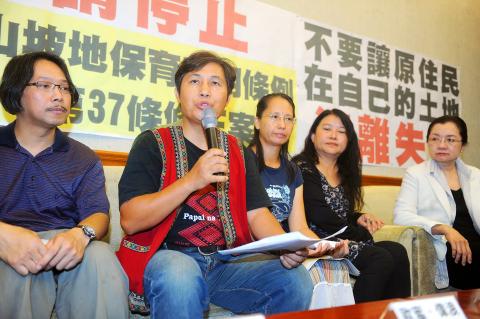Aboriginal activists yesterday urged lawmakers to withdraw a proposed revision of the Act for the Utilization and Transfer of Reserved Mountainous Land (山坡地保育利用條例), which would alter a pending period that currently allows Aborigines to secure the ownership of reserve lands, warning that the planned change could accelerate the loss of Aboriginal lands to developers.
Article 37 of the law stipulates that Aborigines may obtain the right to farm or rent reserved mountainous lands and if an Aborigine legally uses the plot of land for five consecutive years he or she may be granted ownership of the land.
Chinese Nationalist Party (KMT) Legislator Jeng Tian-tsair (鄭天財) of the Amis tribe has proposed deleting the five-year pending period from the article, causing many people to be concerned.

Photo: Liao Chen-huei, Taipei Times
“If the proposed revision is passed, it would be a disaster for us, because it would make it easier for large developers to get hold of Aboriginal reserve land by borrowing Aboriginal names,” said Liu Mei-ling (劉美玲), an Atayal Aborigine from Hsinchu County’s Guansi Township (關西).
“There are a lot of large-scale development projects in Atayal undertaken by non-Aborigines; there are hot spring resorts, coffee shops and hotels, but Aborigines can only work there as janitors, making between NT$18,000 and NT$20,000 a month,” Lin said.
Lin Chang-mau (林長茂), of the Green Formosa Front, said he has witnessed numerous cases in which Aborigines lent their identity to non-Aboriginal developers for between NT$200,000 anmd NT$300,000 so developers can then use the land as collateral for loans worth tens of millions of NT dollars.
“Many Aborigines became indebted because of this. Some ended up becoming homeless because they are too afraid to go home and some have even committed suicide,” Lin said.
Hoyi Ciku, an Atayal pastor from Renai Township (仁愛) in Nantou County, urged all Aborigines to protect their lands and called on the government to actively launch a probe into the illegal use of Aboriginal lands.
“Instead of proposing a relaxation to the restriction now, Aboriginal lawmakers should pass subordinate laws to the Aboriginal Basic Act (原住民族基本法) to better protect Aboriginal lands,” Hoyi said.
Jeng, the amendment’s leading advocate, said he made the proposal because he believed it is not fair that there is no five-year restriction for non-Aborigines, but there is one for Aborigines.
KMT Legislator Kung Wen-chi (孔文吉) of the Seediq tribe agreed.
“Actually, I also support the activists’ idea that non-Aboriginal developers should not get hold of Aboriginal lands, but restricting Aboriginal rights to land ownership is not the way to solve the issue,” Kung said. “The target should be developers, not Aboriginal landowners.”

Beijing could eventually see a full amphibious invasion of Taiwan as the only "prudent" way to bring about unification, the US Department of Defense said in a newly released annual report to Congress. The Pentagon's "Annual Report to Congress: Military and Security Developments Involving the People's Republic of China 2025," was in many ways similar to last year’s report but reorganized the analysis of the options China has to take over Taiwan. Generally, according to the report, Chinese leaders view the People's Liberation Army's (PLA) capabilities for a Taiwan campaign as improving, but they remain uncertain about its readiness to successfully seize

Taiwan is getting a day off on Christmas for the first time in 25 years. The change comes after opposition parties passed a law earlier this year to add or restore five public holidays, including Constitution Day, which falls on today, Dec. 25. The day marks the 1947 adoption of the constitution of the Republic of China, as the government in Taipei is formally known. Back then the Chinese Nationalist Party (KMT) governed China from Nanjing. When the KMT, now an opposition party in Taiwan, passed the legislation on holidays, it said that they would help “commemorate the history of national development.” That

Trips for more than 100,000 international and domestic air travelers could be disrupted as China launches a military exercise around Taiwan today, Taiwan’s Civil Aviation Administration (CAA) said yesterday. The exercise could affect nearly 900 flights scheduled to enter the Taipei Flight Information Region (FIR) during the exercise window, it added. A notice issued by the Chinese Civil Aviation Administration showed there would be seven temporary zones around the Taiwan Strait which would be used for live-fire exercises, lasting from 8am to 6pm today. All aircraft are prohibited from entering during exercise, it says. Taipei FIR has 14 international air routes and

Snow fell on Yushan (Jade Mountain, 玉山) yesterday morning as a continental cold air mass sent temperatures below freezing on Taiwan’s tallest peak, the Central Weather Administration (CWA) said. Snowflakes were seen on Yushan’s north peak from 6:28am to 6:38am, but they did not fully cover the ground and no accumulation was recorded, the CWA said. As of 7:42am, the lowest temperature recorded across Taiwan was minus-5.5°C at Yushan’s Fengkou observatory and minus-4.7°C at the Yushan observatory, CWA data showed. On Hehuanshan (合歡山) in Nantou County, a low of 1.3°C was recorded at 6:39pm, when ice pellets fell at Songsyue Lodge (松雪樓), a